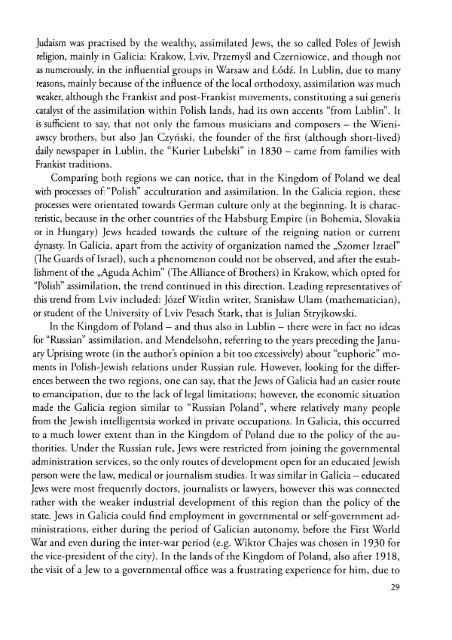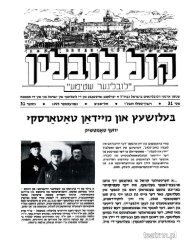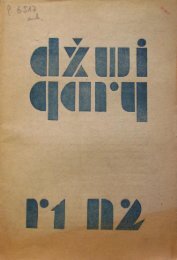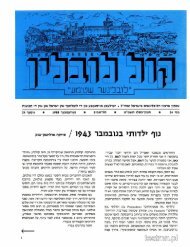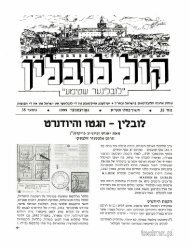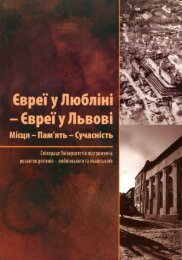The Jews in Lublin - Biblioteka Multimedialna Teatrnn.pl - Brama ...
The Jews in Lublin - Biblioteka Multimedialna Teatrnn.pl - Brama ...
The Jews in Lublin - Biblioteka Multimedialna Teatrnn.pl - Brama ...
Create successful ePaper yourself
Turn your PDF publications into a flip-book with our unique Google optimized e-Paper software.
Judaism was practised by the wealthy, assimilated <strong>Jews</strong>, the so called Poles of Jewish<br />
religion, ma<strong>in</strong>ly <strong>in</strong> Galicia: Krakow, Lviv, Przemyśl and Czerniowice, and though not<br />
as numerously, <strong>in</strong> the <strong>in</strong>fluential groups <strong>in</strong> Warsaw and Łódź. In Lubl<strong>in</strong>, due to many<br />
reasons, ma<strong>in</strong>ly because of the <strong>in</strong>fluence of the local orthodoxy, assimilation was much<br />
weaker, although the Frankist and post-Frankist movements, constitut<strong>in</strong>g a sui generis<br />
catalyst of the assimilation with<strong>in</strong> Polish lands, had its own accents "from Lubl<strong>in</strong>". It<br />
is sufficient to say, that not only the famous musicians and composers - the Wieniawscy<br />
brothers, but also Jan Czyński, the founder of the first (although short-lived)<br />
daily newspaper <strong>in</strong> Lubl<strong>in</strong>, the "Kurier Lubelski" <strong>in</strong> 1830 - came from families with<br />
Frankist traditions.<br />
Compar<strong>in</strong>g both regions we can notice, that <strong>in</strong> the K<strong>in</strong>gdom of Poland we deal<br />
with processes of "Polish" acculturation and assimilation. In the Galicia region, these<br />
processes were orientated towards German culture only at the beg<strong>in</strong>n<strong>in</strong>g. It is characteristic,<br />
because <strong>in</strong> the other countries of the Habsburg Empire (<strong>in</strong> Bohemia, Slovakia<br />
or <strong>in</strong> Hungary) <strong>Jews</strong> headed towards the culture of the reign<strong>in</strong>g nation or current<br />
dynasty. In Galicia, apart from the activity of organization named the „Szomer Izrael"<br />
(<strong>The</strong> Guards of Israel), such a phenomenon could not be observed, and after the establishment<br />
of the „Aguda Achim" (<strong>The</strong> Alliance of Brothers) <strong>in</strong> Krakow, which opted for<br />
"Polish" assimilation, the trend cont<strong>in</strong>ued <strong>in</strong> this direction. Lead<strong>in</strong>g representatives of<br />
this trend from Lviv <strong>in</strong>cluded: Józef Wittl<strong>in</strong> writer, Stanisław Ulam (mathematician),<br />
or student of the University of Lviv Pesach Stark, that is Julian Stryjkowski.<br />
In the K<strong>in</strong>gdom of Poland — and thus also <strong>in</strong> Lubl<strong>in</strong> — there were <strong>in</strong> fact no ideas<br />
for "Russian" assimilation, and Mendelsohn, referr<strong>in</strong>g to the years preced<strong>in</strong>g the January<br />
Upris<strong>in</strong>g wrote (<strong>in</strong> the author s op<strong>in</strong>ion a bit too excessively) about "euphoric" moments<br />
<strong>in</strong> Polish-Jewish relations under Russian rule. However, look<strong>in</strong>g for the differences<br />
between the two regions, one can say, that the <strong>Jews</strong> of Galicia had an easier route<br />
to emancipation, due to the lack of legal limitations; however, the economic situation<br />
made the Galicia region similar to "Russian Poland", where relatively many peo<strong>pl</strong>e<br />
from the Jewish <strong>in</strong>telligentsia worked <strong>in</strong> private occupations. In Galicia, this occurred<br />
to a much lower extent than <strong>in</strong> the K<strong>in</strong>gdom of Poland due to the policy of the authorities.<br />
Under the Russian rule, <strong>Jews</strong> were restricted from jo<strong>in</strong><strong>in</strong>g the governmental<br />
adm<strong>in</strong>istration services, so the only routes of development open for an educated Jewish<br />
person were the law, medical or journalism studies. It was similar <strong>in</strong> Galicia — educated<br />
<strong>Jews</strong> were most frequently doctors, journalists or lawyers, however this was connected<br />
rather with the weaker <strong>in</strong>dustrial development of this region than the policy of the<br />
state. <strong>Jews</strong> <strong>in</strong> Galicia could f<strong>in</strong>d em<strong>pl</strong>oyment <strong>in</strong> governmental or self-government adm<strong>in</strong>istrations,<br />
either dur<strong>in</strong>g the period of Galician autonomy, before the First World<br />
War and even dur<strong>in</strong>g the <strong>in</strong>ter-war period (e.g. Wiktor Chajes was chosen <strong>in</strong> 1930 for<br />
the vice-president of the city). In the lands of the K<strong>in</strong>gdom of Poland, also after 1918,<br />
the visit of a Jew to a governmental office was a frustrat<strong>in</strong>g experience for him, due to<br />
29


